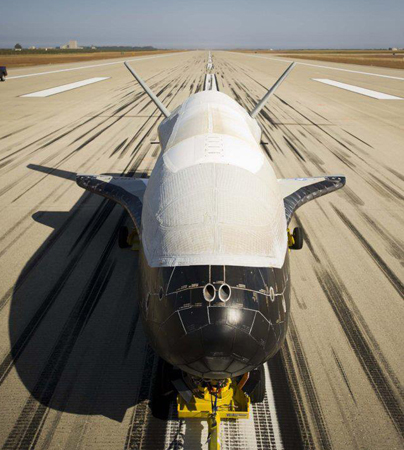United  Launch Alliance has cleared the next launch of an Air Force X-37B reusable spaceplane to occur this week at Cape Canaveral AFS, Fla., after concluding that it has sufficiently mitigated the chances of a booster anomaly repeating itself from a previous satellite launch. A ULA Atlas V rocket is now scheduled to carry the X-37 orbital test vehicle into space on Dec 11, states the company’s Dec. 7 release. This mission, dubbed OTV-3, will be the third space flight of the two-vehicle X-37 fleet. Back in early October, a ULA Delta IV rocket experienced an upper-stage engine malfunction during a GPS IIF satellite launch. The Atlas V utilizes a different version of this same engine, but the Air Force and ULA delayed the X-37 launch until they understood better what happened. ULA’s investigation of the Delta IV anomaly “concluded that a fuel leak occurred” and that the leak “started during the first engine start sequence,” states the release. While the anomaly investigation continues, “all credible crossover implications” for the Atlas V “have been thoroughly addressed and mitigated,” clearing the way for the OTV-3 launch, states the release.
Launch Alliance has cleared the next launch of an Air Force X-37B reusable spaceplane to occur this week at Cape Canaveral AFS, Fla., after concluding that it has sufficiently mitigated the chances of a booster anomaly repeating itself from a previous satellite launch. A ULA Atlas V rocket is now scheduled to carry the X-37 orbital test vehicle into space on Dec 11, states the company’s Dec. 7 release. This mission, dubbed OTV-3, will be the third space flight of the two-vehicle X-37 fleet. Back in early October, a ULA Delta IV rocket experienced an upper-stage engine malfunction during a GPS IIF satellite launch. The Atlas V utilizes a different version of this same engine, but the Air Force and ULA delayed the X-37 launch until they understood better what happened. ULA’s investigation of the Delta IV anomaly “concluded that a fuel leak occurred” and that the leak “started during the first engine start sequence,” states the release. While the anomaly investigation continues, “all credible crossover implications” for the Atlas V “have been thoroughly addressed and mitigated,” clearing the way for the OTV-3 launch, states the release.
The Space Force is moving to bolster its contributions to the long-range kill chains that industry and government officials agree the U.S. will need in a large-scale conflict, leaders said Feb. 24 at AFA’s Warfare Symposium.




